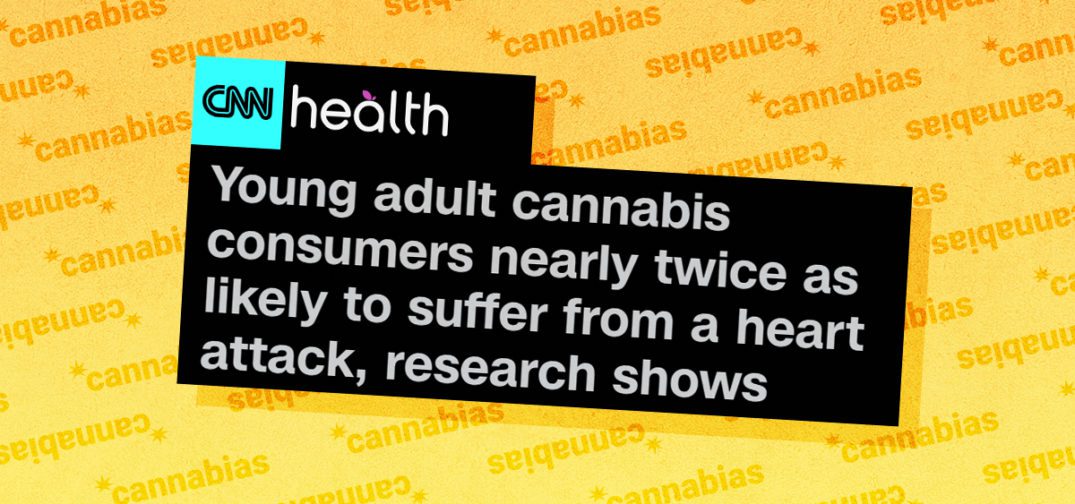CNN’s article, “Young adult cannabis consumers nearly twice as likely to suffer from a heart attack, research shows,” suffers from several biases, including tone, oversimplification, and omission.
Presence of bias:
Tone bias is apparent in the first graph and is meant to scare readers but the study – like the CNN article – “confuses absolute risk for relative risk and makes a huge deal out of 1% risk turning into a 2% risk,” Dr. Mitch Earleywine wrote on Facebook. This assessment may be an indictment of the study itself, but also illuminates the simplicity bias apparent in the CNN report on the study.
“’Some people assume that consuming cannabis is safe and can’t harm your body, but that is incorrect,’ said lead study author Dr. Karim Ladha, clinician-scientist and staff anesthesiologist at St. Michael’s Hospital and the University of Toronto in Canada. ‘There’s increasing evidence that this could potentially be harmful to you, both in the short term and the long term,’ he said.”
“Some people” is an over-generalization and the story fails to dive deeper on Ladha’s claims.
First of all, “some people” assume a lot of things that aren’t true. Most people know that inhaling smoke is not what our bodies were designed to do. Are there “some people” who smoke cannabis and think they are not being harmed in any way by that method of consumption? Sure, but there are also “some people” who believe that smoking tobacco and drinking alcohol aren’t harmful either. When compared with the well-known harms of tobacco and alcohol and the hundreds of thousands of deaths per year attributed to them, does the doctor’s comment actually warrant the level of alarm projected by this article, or does this comment actually refer to the widely-held (and evidence-backed) assumption that cannabis seems to be less harmful than other substances? Careful readers will also note Ladha’s use of the word “potentially.” He’s not being nearly as firm on his position as the article would lead the reader to believe.
Additionally, the article never tells us the primary ingestion method of the 73 cannabis consumers (of the 5,610) enrolled in the study who had a heart attack but the lede doesn’t take this into consideration and strikes an alarmist tone. Also, were these people smokers? Did they use any pharmaceuticals, what was their diet, any drugs, how many children?
“The study did not research how cannabis affects heart health, Ladha said, but he noted that previous research showed the drug can affect a user’s heart rate,” the article states.
Okay, where are the studies, CNN? Not including them is omission bias plain and simple. Your header says, “It can create an irregular heart rate.” Prove it.
Next, CNN shifts to the potency issue. Why? Aside from being alarmist? Did the study know the potency of the cannabis used by the 73 afflicted consumers? This is an example of simplicity bias because the narrative benefits the prohibitionist narrative that we need to keep cannabis outlawed because it is, allegedly, stronger than it was 50 years ago (which happened during prohibition, CNN).
How to remedy:
CNN included zero voices from anyone within the sphere of cannabis legalization. There are thousands of cannabis experts in the U.S. and Canada (including Dr. Mitch) that they could have reached out for comment to, but they instead relied on the study author (whose job is to defend his research) and the chair of the American Heart Association – which, it should be noted, does support removing cannabis from Schedule I under the Controlled substances act. However, their chosen expert does not speak to the study itself, but rather in oversimplified terms. The article would have certainly been fairer had the reporter included scientific voices from within the cannabis industry, referenced the health risks of other legal substances, or mentioned any of the numerous studies that have suggested potential therapeutic value of cannabis in treating a wide variety of conditions. The lede could also have been more honest, instead of implying all methods of cannabis consumption were carefully documented, which they weren’t.
Get daily cannabis business news updates. Subscribe
End
